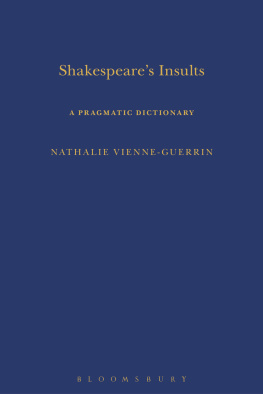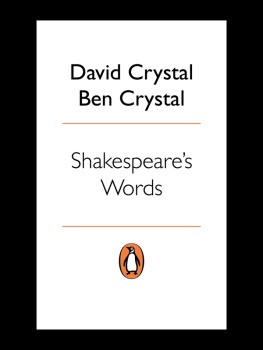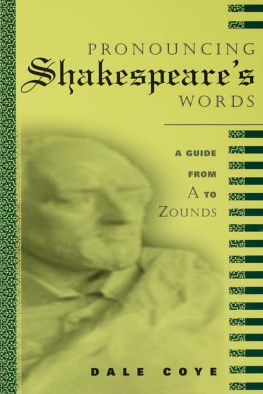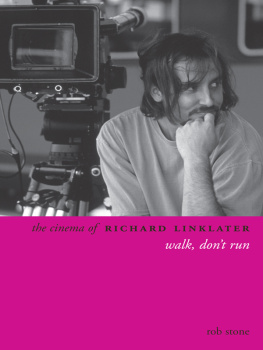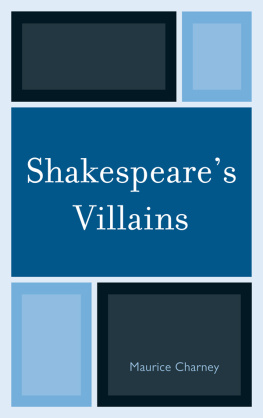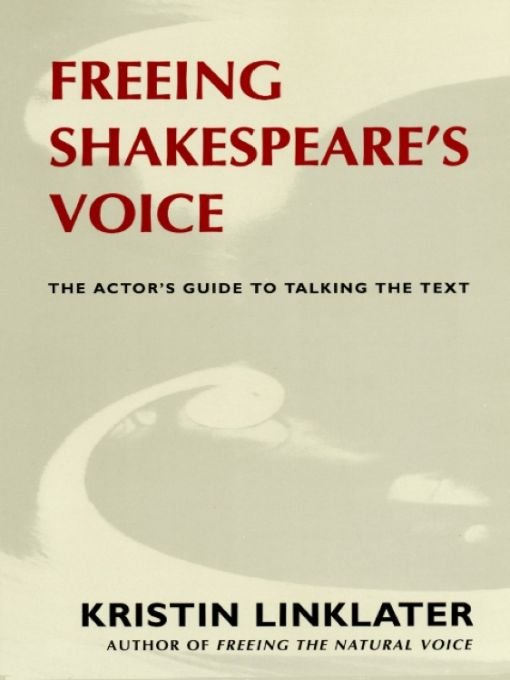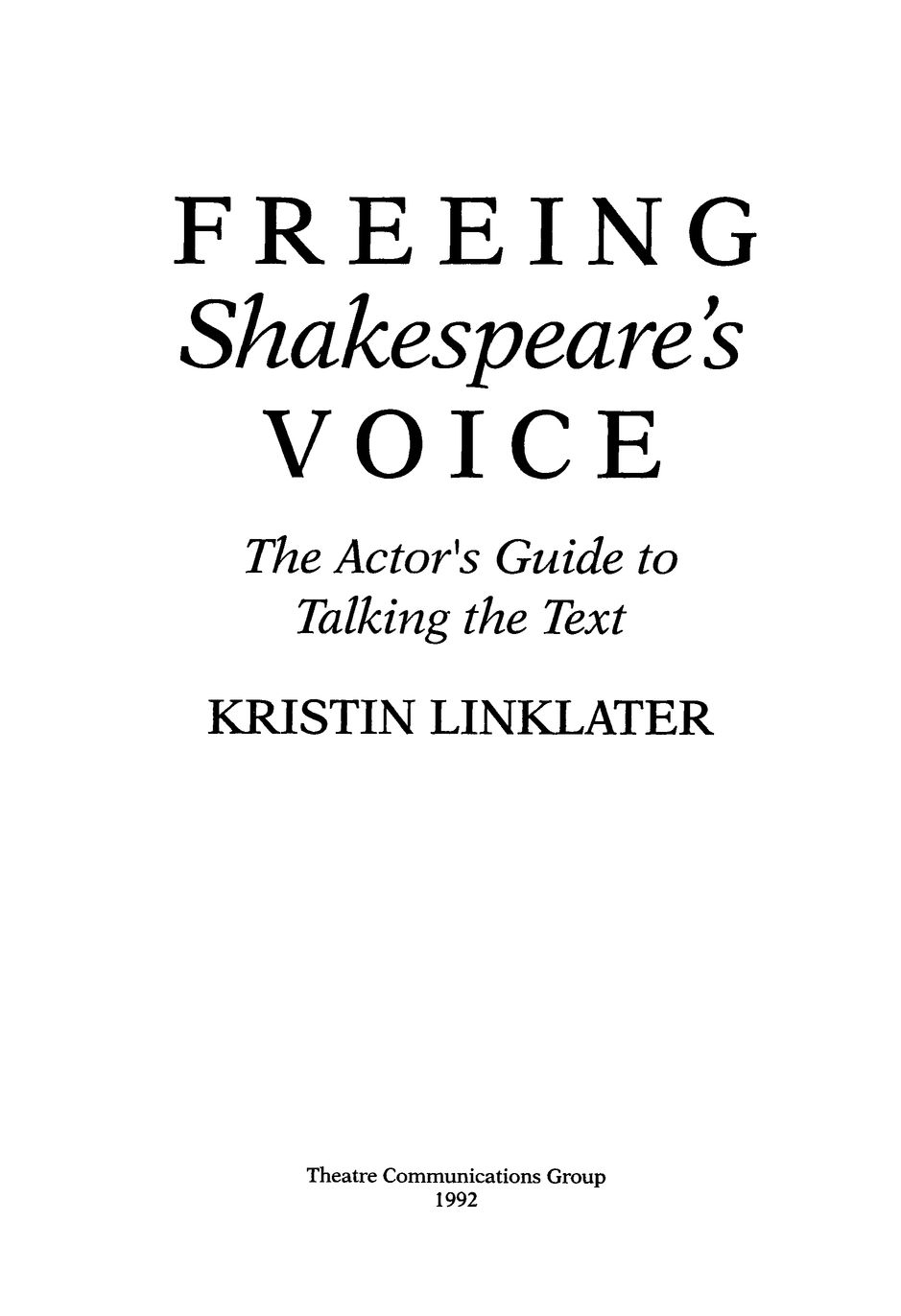Table of Contents
I dedicate this book to my son Hamish,
my mother Marjorie,
and to the memory of my father Eric.
Prologue
This book draws upon my lifein the classroom as teacher and student, on the rehearsal floor as coach and director, on the stage as actor, and in the audience as spectator/listener. The exercises that I have developed for talking Shakespeares text I owe to my students, to what they could not achieve and to what they could. My attempt as a teacher has been to create exercises that would arouse organically the desire for the necessary result and provide causal stimulus for its realization; for that reason my guide to speaking Shakespeare is experiential rather than prescriptive.
There are books on speaking Shakespeare which every serious actor should read and which are by no means replaced by this one. In this book the actor will find an organic approach to the language which s/he may not find elsewhere, but the information on verse-speaking, rhetoric, Elizabethan language structures and Shakespearean word-use can be found in many other places. The wealth of information is such that no one teacher can encompass the whole field. The serious student will accumulate nuggets of vital knowledge from a variety of sources; the manner in which the information is delivered by different teachers and writers may speak to one student and not to another. Freeing Shakespeares Voice speaks to the polished professional as much as to the absolute beginner. I hope it will also speak to the director, be of interest to the scholar and help the playwright to enter the physicality of language.
The most useful books that I know of for the actor who performs Shakespeare are the following: John Bartons Playing Shakespeare (Methuen), Cicely Berrys The Actor and his Text (Scribners), Bertram Josephs Acting Shakespeare (Theatre Arts) and Delbert Spains Shakespeare Sounded Soundly (Garland-Clarke Editions/Capra Press). Added to these practical textbooks are invaluable reference books such as Caroline Spurgeons Shakespeares Imagery (Cambridge), E.M.W. Tillyards The Elizabethan World Picture (Vintage), C.W. Onionss A Shakespeare Glossary (Oxford), Eric Partridges Shakespeares Bawdy (Routledge), and The Oxford English Dictionary.
I myself owe a great deal to Walter Ongs The Presence of the Word (Yale University Press), Richard Foster Joness The Triumph of the English Language (Stanford University Press), many of Frances A. Yatess books, but in particular Theatre of the World (Routledge & K. Paul) and Paul Fussells inspiring Poetic Meter and Poetic Form (Random House). I am most recently grateful to Carol Gilligan and her book In a Different Voice (Harvard University Press).
My heartfelt acknowledgments go to those teachers and fellow workers and students and brave actors who have contributed to my Shakespearean journey: to Tina Packer, Artistic Director of Shake-speare & Company; to the actors and teachers of Shakespeare & Company (specifically, I owe thanks to Jonathan Epstein for information on un and to John Hadden for inspiration on breath and line-beginnings); to John Barton, Michael Langham, Wallace Chappell, Jill Balcon and Barry Boys; and to those no longer on this earth to accept my loving thanks, Michael MacOwan, Bertram Joseph, Michael Warre, Tyrone Guthrie and Wal Cherry.
It is with pride and affection that I salute those teachers who, over the past twenty years, have trained and traveled with me; they carry on and develop Iris Warrens voice work and the text work that I have donenotably Fran Bennett, Andrea Haring and Cecil Mackinnon. Each generation of teachers brings fresh energy and new ideas, and this book is dedicated to their talent and creativity: Normi Noel, Natsuko Ohama, Zoe Alexander, Virginia Ness, Michael Morgan, Christine Adaire, Peter Wittrock, Louis Colaianni, Judith Jablonka, Ariel Bock, Malcolm Ingram, Keely Eastley and Tim Douglas. The teachers of 1991 are worthy of the tradition: Claudia Anderson, Joe Gilday, Brent Blair, Elizabeth Ingram, Trudie Kessler, Paula Langton, James Rice, Patricia Riggin, Judith Shahn, Larissa Solovieva, Eva Wielgat, Walton Wilson and Joanna Weir. I would like also to acknowledge Joseph Jacquinet and Francoise Walot in Belgium and Dianne Eden and Isobel Kirk in Australia.
I am grateful to the Guggenheim Foundation for the fellowship in 1981 which allowed me the breathing-space to explore and test my work without pressure.
Duncan Nelson deserves every ounce of the appreciation I feel for his caring and careful editing. And I am deeply grateful to my beloved brother, Andro Linklater, for last-minute quality control.
Neil Freeman! Thank you!
Always I acknowledge my teacher, Iris Warren, with respect and gratitude.
Introduction
My intention in this book is to offer a de-mystifying approach to speaking Shakespeares text. It is often the most sensitive and talented actors who confess to being terrified of playing Shakespeare and this may well be because they have a strong sense of truth in their acting which depends on their personal emotional commitment to the characters they play and the words the characters speak. Personal truth sometimes seems too small for Shakespeares poetic grandeur.
It is the actors own raw material that makes a character believable. Out of the actor/persons own emotions, intellect, memories, imagination, tragedies, loves, hates, family history, dreams, soul, voice and body a character is forged who is a believable inhabitant of whatever world occupies the stage.
Most actors, if they are earning a proper living through acting, play twentieth-century characters for most of their careers. Most films, television drama, and stage plays hold the mirror up to [contemporary ] Nature, which is exactly what they should be doing. The prime responsibility of the theatre is to show a culture its own face so that it may reflect upon it. But art also has a responsibility to preserve the past, so that a culture may reflect upon itself in the light of its history. Great art lasts, and when the theatre wants to re-produce its past, performers are confronted by artistic demands very different from those posed by contemporary fare. Classical music is played on instruments that bear a distinct resemblance to their ancestors, but classical drama has to be played on a human instrument that experiences and expresses life in a manner radically altered even from a hundred years ago. The Western human behaves, thinks and speaks quite differently now from the days four hundred years ago when Shakespeares classics were contemporary.
The huge subject matter of Shakespeares plays is not the problem. Human nature still spawns extreme acts: old men are cast out into the storm to go mad; teenage lovers commit suicide; women scream at men as Margaret does to York, Why art thou patient, man? Thou shouldst be mad/And I, to make thee mad do mock thee thus, and men reply as does York, How ill-beseeming is it in thy sex/To triumph like an Amazonian trull... Tis beauty that doth oft make woman proud/But God he knows thy share thereof is small; men strangle their wives, falsely suspecting infidelity; political leaders are assassinated; innocent citizens are slaughtered on the streets and on the battlefieldstill.
Such extreme events are still the stuff of theatre as they are still the stuff of life, but the big difference between contemporary drama and Shakespeares drama lies in the language that expresses extremity. Today the unspoken is as dramatic as the spoken on stage because thats how it is in contemporary life. We do not express our passions regularly and the twentieth-century voice goes pretty much unexercised in the language of extreme expression. The general public does not get together and indulge in full-throated singing three or four times a week; families do not regularly sit around and read out loud to each other or discuss matters of substance at length around the dinner table. The industrial revolution, the technological revolution, the rapid growth in literacy and the influence of print have diminished the need for the human voice over the past one hundred fifty years, and we are moving at breakneck speed, in evolutionary terms, further and further away from tens of thousands of years of oral/aural civilization. The oral tradition kept the voice alive in the body but now the


